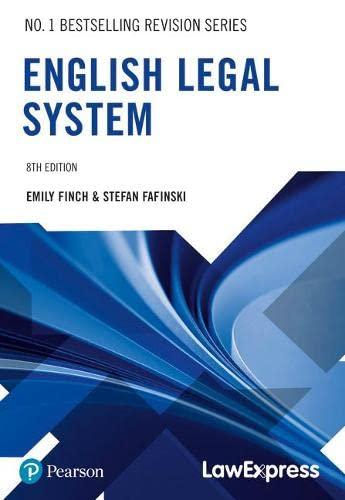Question
THE PAQUETTE HABANA BACKGROUND AND FACTS During the Spanish-American war, the United States Navy seized two commercial fishing ships that were sailing from Havana. The
THE PAQUETTE HABANA
BACKGROUND AND FACTS
During the Spanish-American war, the United States Navy seized two commercial fishing ships that were sailing from Havana. The ships were owned by a Spanish citizen living in Cuba and sailed under Spanish flags. The ships were not armed and not engaging in any hostilities. The owners were unaware of the hostilities between the United States and Spain and of the U.S. blockade of Cuba. The fishing ships were sold by the Navy in Florida as "prizes of war." Their original owner sued for damages in U.S. District Court. The court upheld the seizure and the owner appealed.
JUSTICE GRAY
These are two appeals from decrees of the district court of the United States for the southern district of Florida condemning two fishing vessels and their cargoes as prize of war....
We are then brought to the consideration of the question whether, upon the facts appearing in these records, the fishing smacks were subject to capture by the armed vessels of the United States during the recent war with Spain.
By an ancient usage among civilized nations, beginning centuries ago, and gradually ripening into a rule of international law, coast fishing vessels, pursuing their vocation of catching and bringing in fresh fish, have been recognized as exempt, with their cargoes and crews, from capture as prize of war....
The doctrine which exempts coast fishermen, with their vessels and cargoes, from capture as prize of war, has been familiar to the United States from the time of the War of Independence.... Since the United States became a nation, the only serious interruptions, so far as we are informed, of the general recognition of the exemption of coast fishing vessels from hostile capture, arose out of the mutual suspicions and recriminations of England and France during the wars of the French Revolution....
In the war with Mexico, in 1846, the United States recognized the exemption of coast fishing boats from capture.... International law is part of our law, and must be ascertained and administered by the courts of justice of appropriate jurisdiction as often as questions of right depending upon it are duly presented for their determina tion. For this purpose, where there is no treaty and no controlling executive or legislative act or judicial decision, resort must be had to the customs and usages of civilized nations, and, as evidence of these, to the works of jurists and commentators who by years of labor, research, and experience have made themselves peculiarly well acquainted with the subjects of which they treat. Such works are resorted to by judicial tribunals, not for the speculations of their authors concerning what the law ought to be, but for trustworthy evidence of what the law really is.... This review of the precedents and authorities of the subject appears to us abundantly to demonstrate that at the present day, by the general consent of the civilized nations of the world, and independently of any express treaty or ther public act, it is an established rule of international law, ounded on consideration of humanity to a poor and industrious order of men, and of the mutual convenience of belligerent states, that coast fishing vessels, with their mplements and supplies, cargoes and crews, unarmed and honestly pursuing their peaceful calling of catching and bringing in fresh fish, are exempt from capture as prize of war....
This rule of international law is one which prize courts administering the law of nations are bound to take judicial notice of, and to give effect to, in the absence of any treaty or other public act of their own government in relation to the matter....
Decision. The Supreme Court reversed the district court and said that under an established rule of interna tional law, peaceful fishing vessels are exempt from capture as prizes of war. The Court ordered that the owner receive payment for the loss of the ship, along with damages and costs. The Court acknowledged that it was bound to take judicial notice of international law and that international law is a part of American law.
Case Questions
1. What are the sources of international law?
2. Why did the court review the history of the conduct of the nations during wartime?
3. Which international custom applied to this dispute?
Step by Step Solution
There are 3 Steps involved in it
Step: 1

Get Instant Access to Expert-Tailored Solutions
See step-by-step solutions with expert insights and AI powered tools for academic success
Step: 2

Step: 3

Ace Your Homework with AI
Get the answers you need in no time with our AI-driven, step-by-step assistance
Get Started


